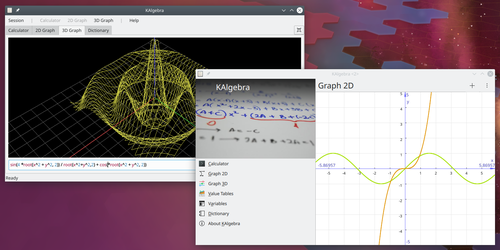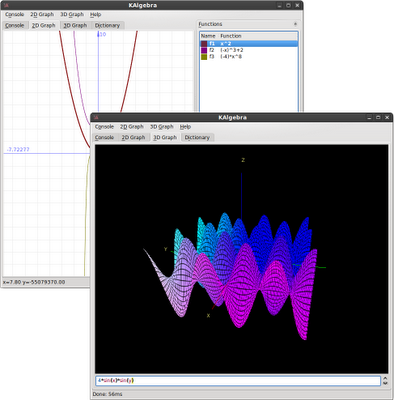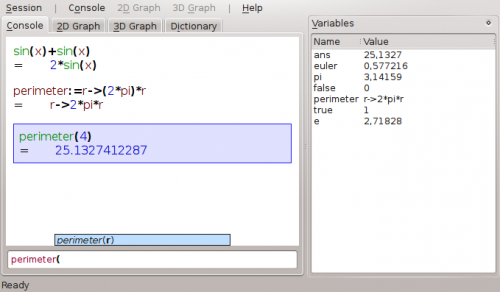KAlgebra: Difference between revisions
| Line 97: | Line 97: | ||
<!--T:14--> | <!--T:14--> | ||
[[Image:Kalgebra3.png|thumb|500px|center| ]] | [[Image:Kalgebra3.png|thumb|500px|center| ]] | ||
[[Image:kalgebra-main-window.png|thumb|500px|center| ]] | [[Image:kalgebra-main-window.png|thumb|500px|center| ]] | ||
[[Image:mathmlfunctionsview.png|thumb|500px|center| ]] | |||
Revision as of 21:50, 1 December 2010
Home » Applications » Education » KAlgebra

|
KAlgebra is a calculator with symbolic and analysis features that lets you plot 2D and 3D functions as well as to easily calculate mathematical expressions. It is part of the KDE Education Project. |

First Steps with KAlgebra
Here is a short tutorial how to use the console tab.
Let's get started with a little example of how KAlgebra works, just type:
2+3
Then type Return and KAlgebra will show you the result. So far it's easy.
However, KAlgebra is much more powerful than that, it started as a simple calculator, but now it's almost a CAS.
You can define variables this way:
k:=3
And use them normally:
k*4
And that will give you the result: 12
You can also define functions:
f:=x->x^2
And then use them:
f(3)
Which should return 9.
You can define a function with as many variables as you want:
g:=(x,y)->x*y
The possibilities of defining functions are endless if you combine this withe the piecewise. Let's define the factor function:
fact:=n->piecewise { n=0 ? 1, n=1 ? 1, ? n*fact(n-1) }
Yes! KAlgebra supports recursive functions. Give some values to n, to test it.
fact(5)
fact(3)
KAlgebra has recently started support for symbolic operations, to check it out, just type:
x+x+x+x
x*x
It doesn't work on some complex structures, though. Only basic support so far.
The last thing I'm going to mention about KAlgebra is its support for differentiation.
An example of the syntax:
diff(x^2:x)
Another resource that can be useful to learn more about KAlgebra comes with KAlgebra: The tab. It contains examples of every function supported by KAlgebra. Maybe the best way to learn how to do things with KAlgebra.
Documentation
Screenshots


